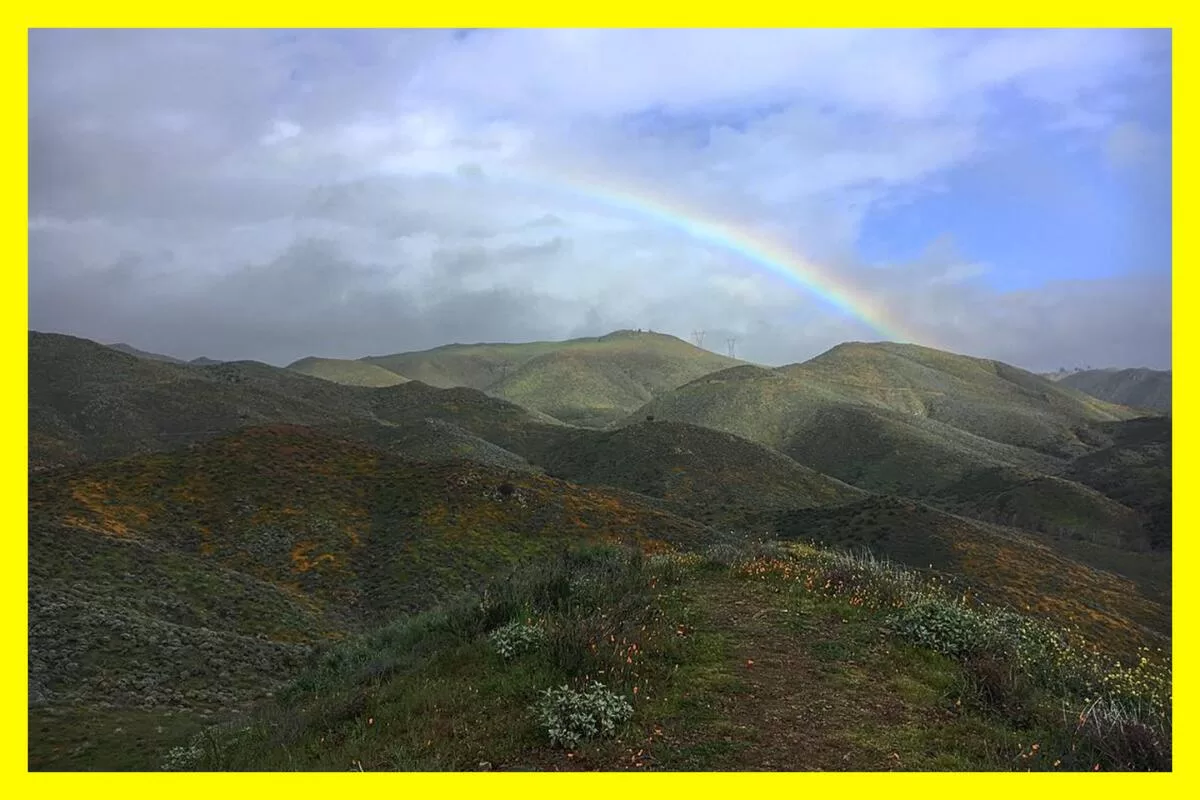One Sunday morning in March 2019, I asked my wife to get in the car and go on a road trip with me. I decided to keep our destination a surprise, but I knew as we sped along the 15 Freeway that we were headed toward the land of wildflowers.
At the time, I was working as a night reporter. Longtime Wild writer Mary Forgione had tipped me off that Walker Canyon near Lake Elsinore was exploding with poppies.
Newsletter
You are reading The Wild newsletter
Sign up to get expert tips on the best of Southern California’s beaches, trails, parks, deserts, forests and mountains in your inbox every Thursday
You may occasionally receive promotional content from the Los Angeles Times.
As we neared our exit, my wife looked out the window and wondered aloud what on a nearby hillside was that orange. This is when I couldn’t help it any longer and revealed that they were poppies, and we were about to be among thousands of them.
We easily found parking amid a small crowd of visitors. But over the next few weeks, that superbloom of bright orange poppies exploded in popularity, prompting Lake Elsinore officials to call it a “poppy nightmare” for all the naughty ways visitors tried to catch a glimpse of the natural wonder. About six weeks in, Lake Elsinore declared the superbloom was over. I wrote a cheeky obituary in its memory.
That spring seemingly raised all expectations for what “wildflower season” could bring. These days, tracking down a superbloom each spring is a bit of a sport.
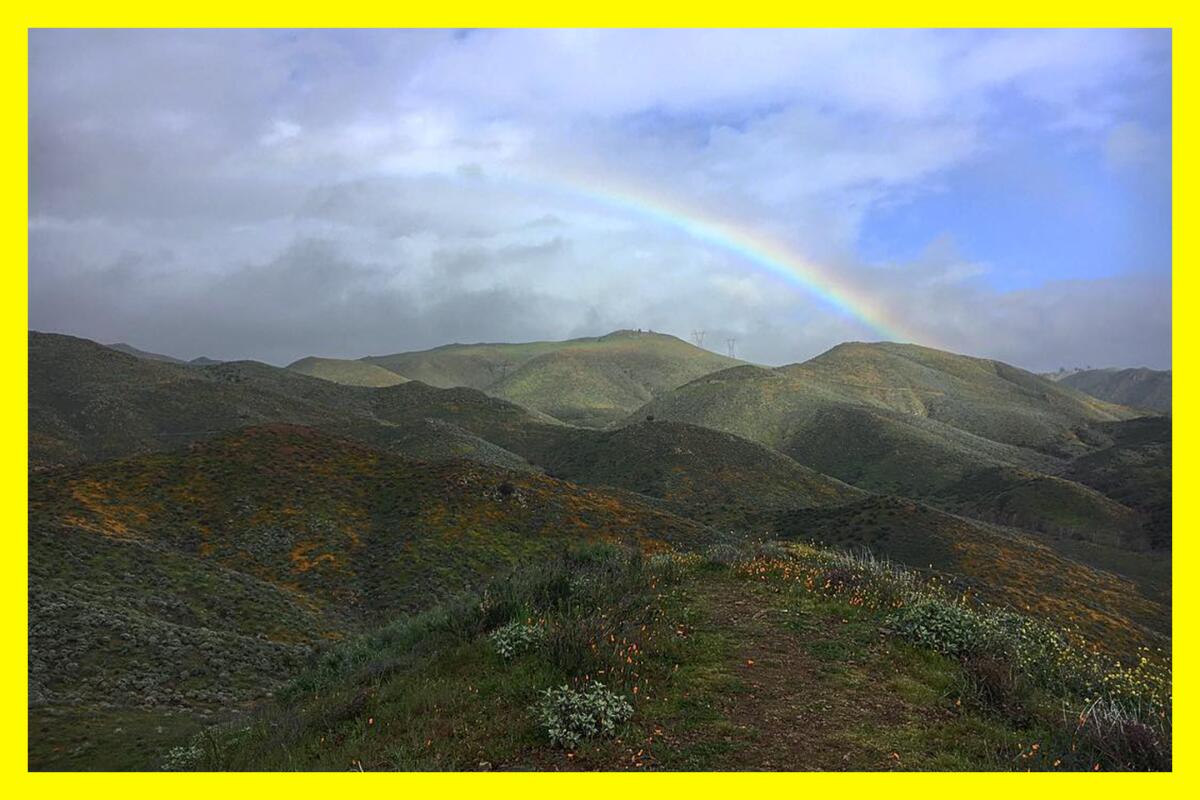
Wild writer Jaclyn Cosgrove at the 2019 superbloom at Walker Canyon in Lake Elsinore.
(Jaclyn Cosgrove / Los Angeles Times)
Though I can’t claim to know when the next one will happen, I can suggest a few campgrounds to book right now to guarantee that, this spring, you’ll wake up among the wildflowers.
I recommend not dilly-dallying. Campgrounds near wildflowers are popular spring destinations and book quickly. And dates are already starting to fill up, given that the California Department of Parks and Recreation releases campground spots each day at 8 a.m. six months in advance on a rolling basis, as does Death Valley National Park and Los Padres National Forest, both daily at 7 a.m.
In terms of when to book, I’ve done my best to outline when a region’s wildflower season typically is. I’ve also included links to organizations that closely track wildflower blooms in hopes that’ll arm you with the best information for when to book your stay.
I cannot promise you a field of flowers (or a rose garden), but I can guarantee that if you proceed mindfully into your trip, you’ll leave grateful of whatever nature brings.
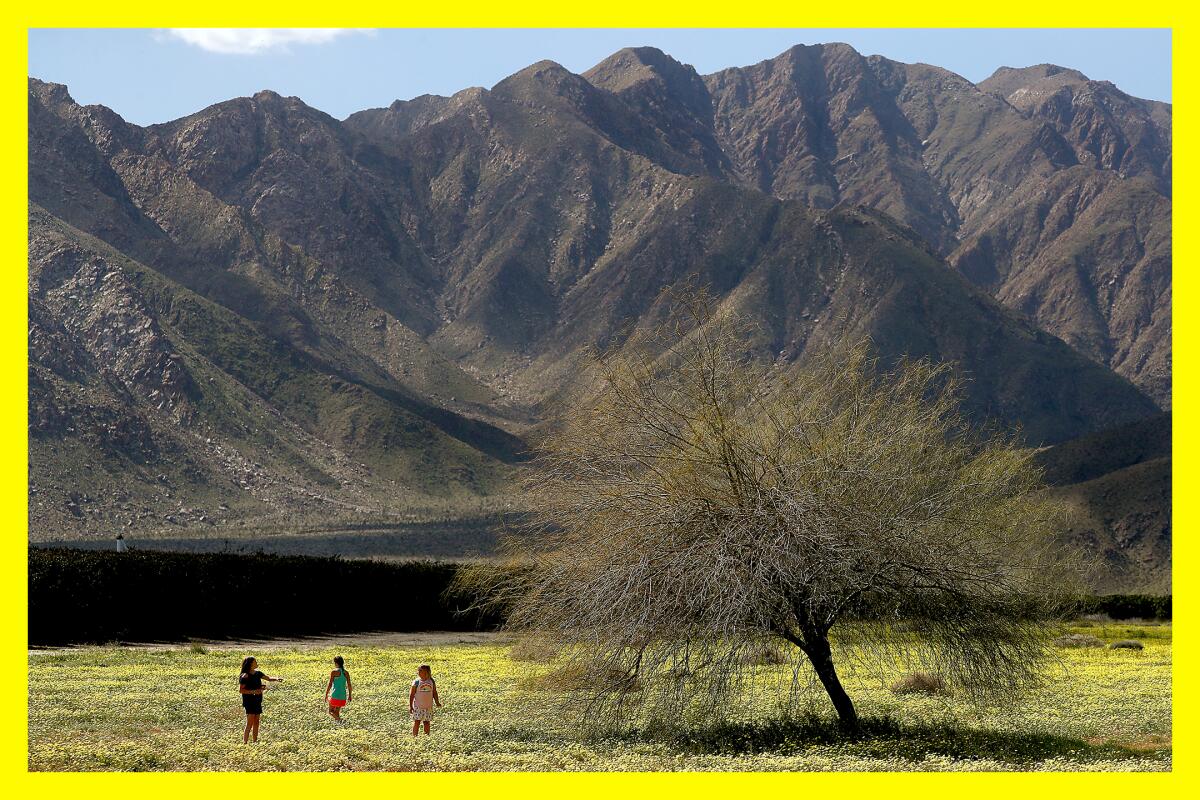
Children play in a field of wildflowers near Coyote Canyon at Anza-Borrego Desert State Park.
(Luis Sinco / Los Angeles Times)
1. Anza-Borrego Desert State Park
Anza-Borrego Desert State Park is almost 650,000 acres of desert ecosystem that is often dotted with wildflowers each spring. About a three-hour drive southeast from L.A., thousands flock each year to California’s largest state park to see its cacti flowering and its fields filled with other native blooms.
It is challenging to predict how many wildflowers there will be each spring. That said, it’s generally agreed that they start to pop up in late February, peak in mid-March and begin wilting around mid-April.
Anza-Borrego Desert State Park offers a wildflower hotline — (760) 767-4684 — and its foundation provides frequent updates of blooms sighted in the park. You can also find frequent updates and ask questions at the park’s Instagram page.
The park is also a designated International Dark Sky Park and is known for epic stargazing. If you perhaps wanted to feed two birds with one scone, you could book a campsite for Thursday, March 13, or Saturday, April 12, to (hopefully!) see wildflowers and a full moon. (Or for a darker sky, choose a time when there’s a new moon.)
There are primitive first-come, first-served campsites in the park, and dispersed camping is allowed in certain areas. . But for those who’d like the peace of a reservation, consider booking one of the campgrounds below.
Campgrounds in Anza Borrego are already available to book in March, and they’re rolling out dates in April now. As of this writing, there were still spots available, even on weekends, but that will likely change as folks start planning out their 2025 adventures.
- Borrego Palm Canyon: This large campground is a short drive from Henderson Canyon Road, which is known for its flower fields. It features coin-operated hot showers and is generally open until April 30. It is $35 per night plus fees. Book through reservecalifornia.com.
- Tamarisk Grove Campground: Open until (no joke) April 1, this campground has 27 sites, including about a dozen primitive cabins with wooden sleeping platforms. Booking a tent site costs $35 and booking a cabin is $70. (Both of these include fees.) This site is near the Yaqui Well Trail, where fishhook cactus and other flowers have been known to bloom.
- Agua Caliente County Park: This is actually a San Diego County park in Anza Borrego. It’s known for its hot springs and hiking. Spring dates are available now via reservations.sdparks.org. Open Labor Day to Memorial Day.
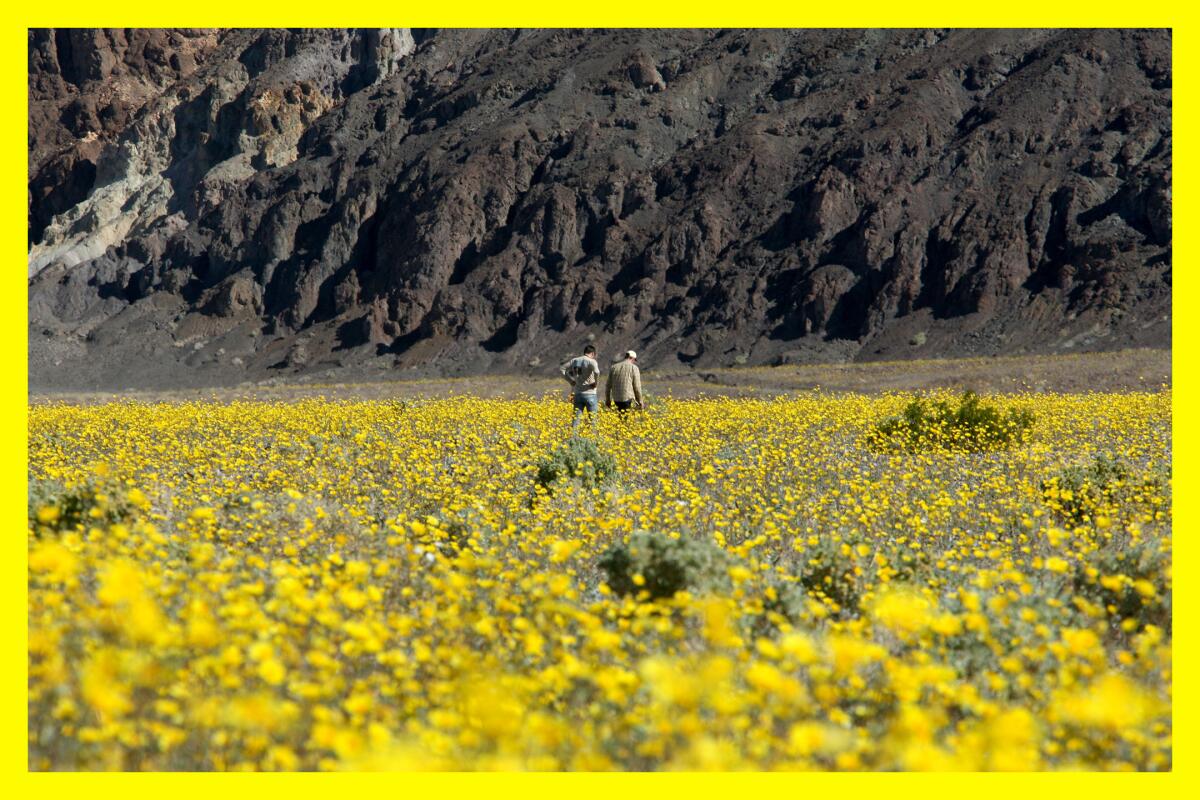
Visitors take in a superbloom at Death Valley National Park.
(Raul Roa / Los Angeles Times)
2. Death Valley National Park
Yes, there is abundant life in Death Valley! And thanks to the wide range in elevation, wildflower season in Death Valley National Park runs from mid-February to mid-July. Early on, you might spot a gravel ghost or desert gold in the park’s foothills. Desert mariposa lily and magnificent lupine grow in early summer in the park’s mountains and juniper woodlands.
You have a few options regarding where and how you camp. Death Valley has multiple first-come, first-served campgrounds and allows roadside and backcountry camping in some areas.
That said, you can reserve a spot at the Furnace Creek Campground, which has drinking water and flush toilets, from Oct. 15 to April 15 by calling (877) 444-6777 or visiting Recreation.gov. Tent camping starts at $30. Weekends are starting to fill up, so book sooner rather than later. (Send flower pics if you go!)
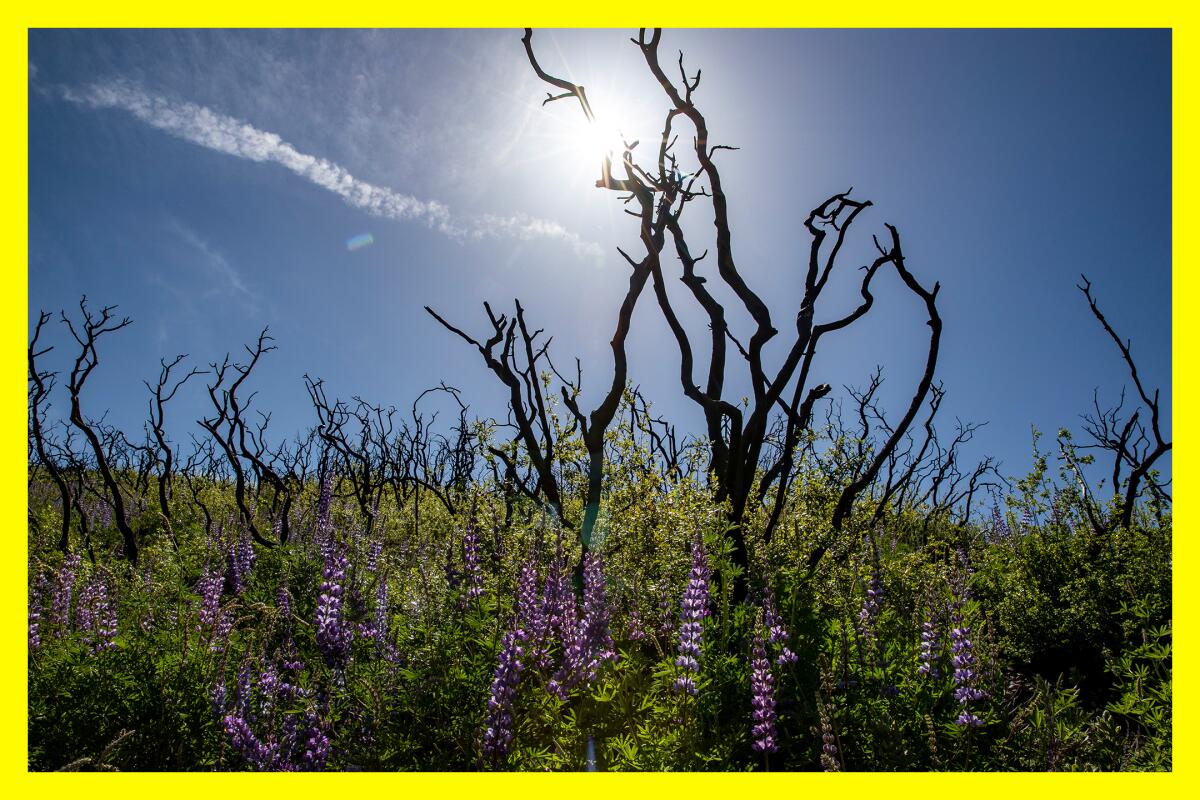
Lupine blooms along a trail near the Nordhoff fuel break in the Los Padres National Forest. The 2017 Thomas fire burned the area, near Ojai.
(Brian van der Brug / Los Angeles Times)
3. Los Padres National Forest
The Mt. Figueroa Campground is about 150 miles west of L.A. and is known for its abundant diversity of wildflowers. Its bloom season is typically in late February to early March and, depending on the temperature, can last through May.
The campground has about 35 sites, including nine that are first-come, first-served. The rest are reservable through recreation.gov for $30 plus fees. There is no drinking water available, and its restrooms are vault toilets.
Honorable mentions:
- Rolling M. Ranch campground in Chino Hills State Park: This $30-a-night spot features flush toilets and is only about two miles from the Bane Ridge Trail, an area that this past spring offered the best wildflower viewing experience. Flowers included arroyo lupine and California poppies.
- Red Rock State Park: The park has a first-come, first-served campground for $25 per night per site. Its 50 sites sit next to massive rock formations (which you can hike atop). Wildflower season is generally mid-March through April and into May and can include Mojave aster and desert trumpet.
- Saddleback Butte State Park: This desert park near Lancaster boasts blooms from February to May, as long as Mother Nature sees fit. Its 37-site campground includes ramadas for shade, wind blocks and flush toilets. It is $20 per night, or $10 a night for those with a disabled person parking placard. Bonus: The Butte Valley Wildflower Sanctuary is nearby.
Regardless of where you choose to stay, I think wildflowers are worth the gamble. Please let me know what you find out there!

3 things to do
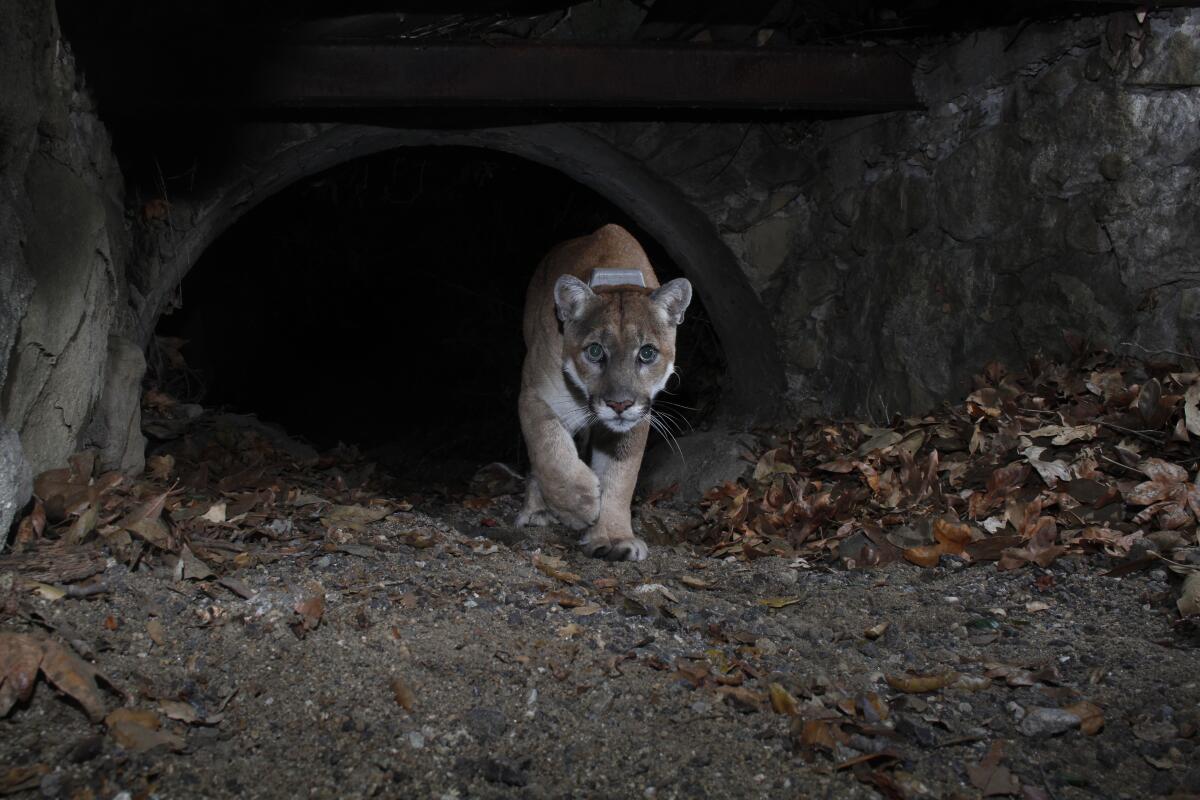
P-22 in Griffith Park.
(Miguel Ordeñana)
1. Celebrate the life of P-22 in Griffith Park
Although we miss our urban king, we can still celebrate the life and impact that L.A’s most famous mountain lion has had on our awareness of urban wildlife. The annual P-22 Day Festival will take place from 11 a.m. to 3:30 p.m. Saturday at Shane’s Inspiration in Griffith Park. You can visit booths of local nonprofits, artists and others, learning about the variety of work being done to keep L.A. wild. The festival is free and open to all. Learn more at the event’s Facebook page.
2. Honor Indigenous Peoples Day at Eaton Canyon
Take a free ethnobotany walk through Eaton Canyon today from 6 to 7 p.m. as part of the nature center’s slate of events for Indigenous Peoples Day. Participants will learn about California native plants and how they have been used traditionally by Indigenous peoples for medicine, tools, clothing, food and more. Learn more at the park’s Instagram page.
3. Take a spooky stroll in Beverly Hills
Get your tickets now for TreePeople’s special Halloween moonlight hike from 7 to 9:30 p.m. Oct. 25 at Coldwater Canyon Park in Beverly Hills. The event will feature costumes, live music and — boo! — some jump scares along one of the routes. Tickets are $20 and may sell out. Children are welcome while dogs are discouraged from attending. Learn more at TreePeople’s booking page.

The must-read
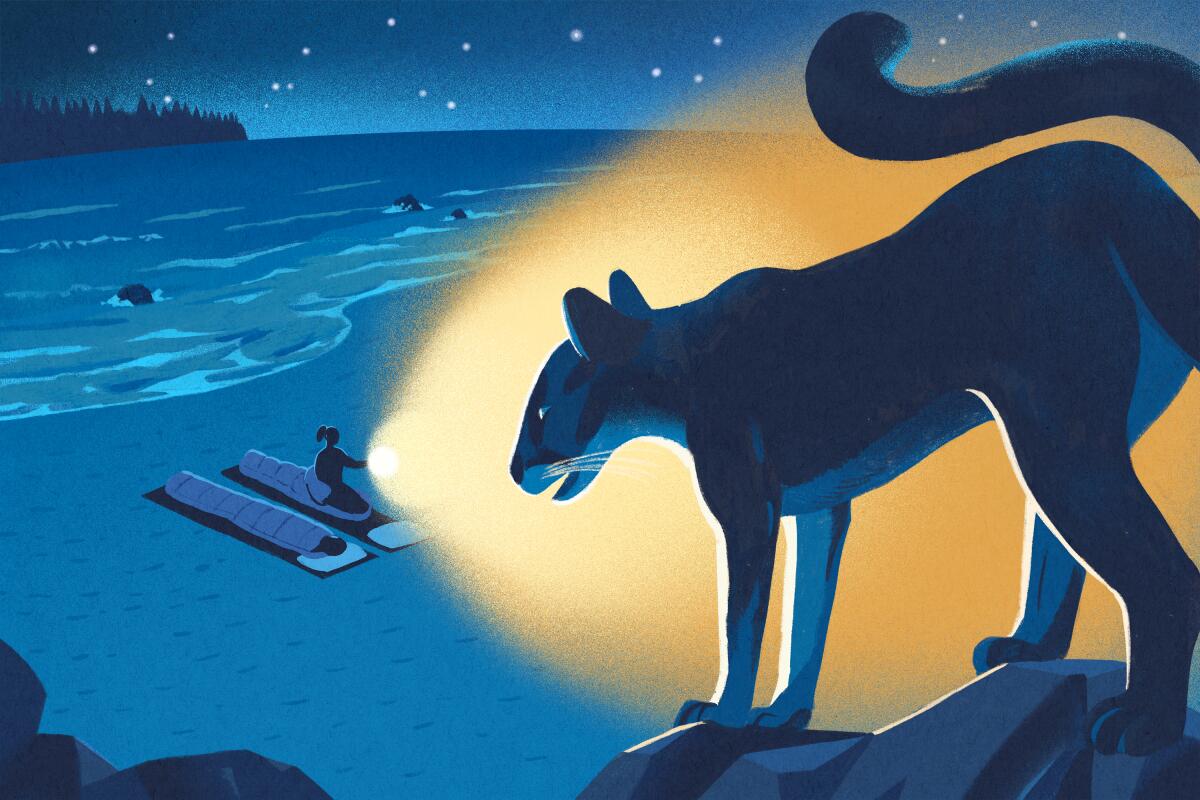
(Ryan Johnson / For The Times)
I have long been obsessed with outdoor survival stories. I love rooting for a lost hiker, listening as they think through everything they brought in their pack and how it will serve them. That’s why I am delighted to announce the launch of Between a Rock, The Times’ monthly series featuring stories from Californians about how they made it through an outdoors emergency in the wild West. Our first essay is from Tania Davidson, a psychologist who loves the outdoors and has spent years backpacking. Tania shares how she regrettably paid no mind to the signs at a Lost Coast campground warning of mountain lions in the area. “I went, ‘What? It’s the beach,’” Tania said. When she alerted her boyfriend, Steve, about the lion stalking their campground, he went back to sleep. Read on to see how this one ends!
Happy adventuring,

P.S.
All this talk of wildflowers and spring has made me fail to mention — hallelujah! It is finally feeling like fall in L.A.! That said, for those who thrive on seasonal changes, SoCal can be a hard place to live. I offer you two solutions of sorts: considering making peace with the season, as freelance journalist Alexis Landau did to save her mental health during this time of year, or visit a place that looks like fall. You could road trip to one of these six cozy mountain towns, where you’ll undoubtedly feel more fall vibes than sunny L.A. I can personally vouch for Wrightwood, Idyllwild and Lake Arrowhead, and really need to make my way north to Kernville! Safe travels, friends.
For more insider tips on Southern California’s beaches, trails and parks, check out past editions of The Wild. And to view this newsletter in your browser, click here.
